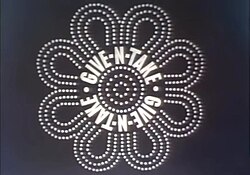| Revision as of 17:53, 24 January 2009 editCowboySpartan (talk | contribs)Pending changes reviewers, Rollbackers21,293 edits →Bonus Round← Previous edit | Revision as of 17:56, 24 January 2009 edit undoCowboySpartan (talk | contribs)Pending changes reviewers, Rollbackers21,293 editsNo edit summaryNext edit → | ||
| Line 15: | Line 15: | ||
| |}} | |}} | ||
| '''''Give-n-Take''''' was an American television game show |
'''''Give-n-Take''''' was an American television game show similar in format to ], another game show aired in the 1960s. ] hosted the program on CBS which aired from ] to ], ] for a total of 60 episodes. | ||
| Production continued as a time slot-filler until CBS was ready to expand '']'' to a full hour from its then-current 30 minutes. The series was canceled shortly after the 60-minute ''TPiR'' premiered in 1975. | |||
| This was Lange's second consecutive CBS daytime game show flop following '']'', which ended its run the Friday before ''Give-n-Take'' premiered. | |||
| ==Rules of the Game== | ==Rules of the Game== | ||
Revision as of 17:56, 24 January 2009
| Give-n-Take | |
|---|---|
 Give-n-Take title logo. Give-n-Take title logo. | |
| Created by | Carruthers Co. Productions |
| Starring | Jim Lange; announcer: Johnny Jacobs |
| Country of origin | |
| Production | |
| Running time | 30 Minutes |
| Original release | |
| Network | CBS |
| Release | September 8 1975 – November 28 1975 |
Give-n-Take was an American television game show similar in format to Say When!!, another game show aired in the 1960s. Jim Lange hosted the program on CBS which aired from September 8 to November 28, 1975 for a total of 60 episodes.
Production continued as a time slot-filler until CBS was ready to expand The Price is Right to a full hour from its then-current 30 minutes. The series was canceled shortly after the 60-minute TPiR premiered in 1975.
Rules of the Game
Four female contestants competed, including a returning champion. Each contestant was seated in one portion of an eight-spaced board, shaped like a daisy.
Each contestant's bank was staked with a prize and the dollar value revealed to all contestants.
A prize was described (but not the prize's value) and Host Lange asked a question. The contestant who buzzed in and gave the correct answer took control of the four neutral spaces on the board, in addition to their own, giving them a total of five spaces. The other three contestants controlled the spaces in which they sat.
The contestant who answered the question correctly stopped a large arrow from spinning in the middle of the board. The contestant on whose space the arrow stopped won control of the prize. That contestant could then do one of the following:
- Keep the prize, in addition to whatever prizes she had already banked.
- Keep the prize and pass any other prize(s) she had banked to an opponent.
- Pass the prize, keeping all other prizes banked.
- Pass the prize and any other prize(s) banked.
After a prize was assigned, a bell or buzzer was heard indicating whether or not that contestant's bank value was below $5,000. The actual value of the bank was never revealed, only whether or not they were below the $5,000 target. Play then repeated in the same manner, with a new prize described.
A contestant could freeze at any point if she thought she was close to the $5,000 limit, preventing her from receiving any other prizes passed to her from her opponents.
If a contestant's bank value was over $5,000, that player was "frozen" and unable to accept any other prizes passed to them by their opponents. The player was then required to answer another question in the manner described above, passing one or more prizes in order to reduce the value of their bank.
The player whose bank was closest to $5,000 won all the prizes in their bank and advanced to the bonus round. The other players left with parting gifts.
Bonus Round
The champion selected one of the eight spaces on the board and stopped the arrow from spinning. If the arrow landed on the space selected, the contestant won $5,000 in cash and all the prizes described that day, in addition to what they had already won, which generally totaled around $15,000.
A champion could remain on the show for a maximum of five days or until they reached CBS's $25,000 winnings limit.
Episode status
This show's status is unknown, and rumored to be completely destroyed. One episode exists on the trading circuit.
See also
- Say When!! (a 1960s game show similar to Give-n-Take)
External links
This article about a television show originating in the United States is a stub. You can help Misplaced Pages by expanding it. |